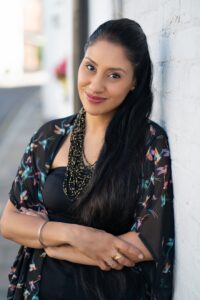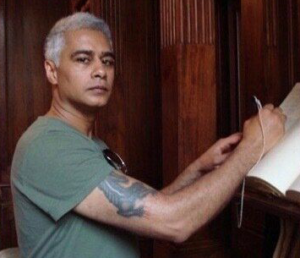Harkirat Kaur Assi, or “just Kirat” as she is more commonly known, artistic director of Punjab Arts, will be leading an Army@TheVirtualFringe webinar on Monday, 24 August. In it she will use her own long relationship with the arts to delve into the increasing correlations and relationships it has with the themes of heritage, culture and identity.
Though Kirat is currently the Artistic Director for Punjab Arts CIC, she has worked with artists of many cultures and many disciplines in the UK for over 15 years, and this is something that’s important to her.

Within these realms, she explores how the arts are such an important form of creative self-expression for artists. Creativity often flourishes through oppression, and Kirat is particularly interested in how the artistic landscape has changed and is still changing in Britain for black and South Asian and other minority ethnic groups.
Born in Britain herself to first generation Asians, her parents are both born in East Africa, and her grandparents all hail from Punjab in an India before partition. Her own heritage is rich, and as a British citizen and a West Londoner, she positively embraces the cultural diversity of the society she lives in whilst still maintaining a strong, traditional identity.
Her own love of the arts was born out of her heritage, when her grandmother first taught her a simple melody on the harmonium at a tender age of five. Her curiosity was further awakened as she progressed through school and saw the parallels between the arts of two different cultures and how different they also were. She was being recognised for her creative writing, and also learning to play several Western instruments, taking part in choirs and orchestras, and theatre and acting became a passion too. At just 15, NYT came knocking to offer her a prestigious place on a scheme, which she knew she couldn’t accept because culturally it was still unacceptable, but in her naivety she also didn’t realise just how prestigious it was for her to have been approached.
Yet she still feels lucky to have had so much direct exposure at a young age to so much, including the traditional aspects of her upbringing which placed value on faith and heritage and introduced her to the arts. She was exposed to many of the pioneers of the British South Asian arts scene from the 80s onwards, with her uncle sound engineering for legendary bhangra bands, respected pioneering broadcasters amongst her family, and outside of her family there was a flourishing cultural arts scene on her doorstep in West London, with HAC, and venues such as Khambays, the Tudor Rose and most prolifically at Watermans at the time.
It was here in her teens she stumbled across so much that made sense to her as a British, South Asian, Punjabi Sikh girl but she found this sense most poignantly in the work of the late Parv Bancil, one of the most significant playwrights of the time. For Kirat wrote with honesty and integrity that audiences of her heritage and culture found challenging and artists at the same time, profound. And just a few years later she found herself being asked to work on one of Parv’s plays.

Forging a career in the arts in a traditional setting was extremely difficult for Kirat, but while pursuing the academic root she never quite let it go. Quietly, she continued to be involved in various projects and roles in the arts, including rethinking Black History Month for a whole borough over three years, always championing the important role the Arts plays in our society and the greater world as a whole, and also championing accessibility to the Arts.
After a hiatus of a few years for personal reasons, Kirat returned to the arts a couple of years ago and found herself being approached to work on several projects, all South Asian, and more specifically Punjabi. Again, with the changing landscape artistic landscape, with digital art and social media now playing a huge part, this was expected but has also presented Kirat’s integrity towards the arts and her identity with some turmoil in questioning how society validates or invalidates art and artists with their heritage or cultural perspectives and whether this is OK for her as a creative.
Kirat is aware she may pose some potentially controversial questions about art and identity for some, but as with so much in art, it’s not about being right or wrong but more about reflection and opening up the discussion on where lines should be drawn when it comes to art and identity… or whether there should be any at all.
Reserve a place through https://www.armyatthefringe.org.


















































